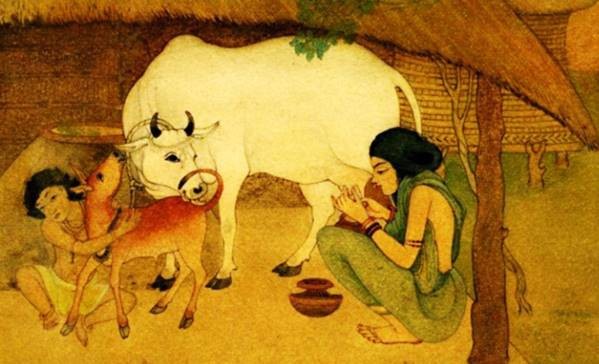The Significance of Cows in Indian Mythology

By using this site, you agree to the Privacy Policy and Terms of Use.

The Significance of Cows in Indian Mythology
In Indian mythology, the cow holds a unique and revered status, symbolizing abundance, purity, and non-violence. In Hinduism, the cow is not merely an animal but a symbol of divine qualities, deeply embedded in the spiritual and cultural fabric of the country. For centuries, cows have been cherished and revered, forming an integral part of religious practices and daily life.
Cows are considered sacred animals in Hinduism, often associated with various deities and divine figures. The goddess Kamadhenu, also known as the “cow of plenty,” is believed to grant wishes and provide abundance. She represents the ideal of unselfish giving and is said to fulfill every need of the worshiper. The cow, as a symbol of prosperity, embodies qualities of gentleness, patience, and nurturing, attributes that are revered in Hindu teachings.
In Hindu mythology, the cow is closely linked to Lord Krishna, one of the most beloved gods in the religion. Krishna, often depicted as a cowherd, is seen as the protector of cows, and his relationship with them is symbolic of divine love and care. The act of caring for cows is thus regarded as a noble and righteous task, one that brings the devotee closer to the divine.
Beyond its religious importance, the cow also holds symbolic value in Indian culture. It represents nourishment, as it provides milk, which is a staple in many Indian diets. Milk is used in various religious rituals, offerings, and ceremonies, further elevating the status of the cow in spiritual practices. The cow’s gentle nature is also associated with non-violence (Ahimsa), a key principle in Hinduism, Buddhism, and Jainism.
The Vedas, ancient sacred texts of Hinduism, contain numerous references to cows, further solidifying their sacred status. In the Rigveda, cows are depicted as a source of wealth and prosperity, with the term “Go” (meaning cow) being synonymous with riches. During yajnas (sacrificial rituals), cows were often offered as a gesture of devotion and gratitude to the gods, symbolizing purity and auspiciousness.
The cow’s role in rituals extends to modern times as well, with many Hindu festivals, such as Gopuja, celebrating cows and their contribution to life. On this day, cows are worshiped, decorated with garlands, and given special food offerings, reaffirming their esteemed position in Hindu society.
In modern India, the reverence for cows has sparked a wide-reaching cow protection movement. Many states have passed laws to protect cows from slaughter, reflecting the deep respect and sanctity associated with the animal in Indian culture. The cow continues to be a symbol of spiritual purity and a link between India’s rich religious heritage and its present-day practices.
In Indian mythology, the cow is much more than just an animal; it is a symbol of prosperity, purity, and divine love. Revered as sacred, the cow holds a place of honor in Hinduism and Indian culture, reflecting the spiritual and cultural values that have shaped the country for centuries. Whether through its associations with divine figures or its role in rituals, the cow’s significance remains profound, embodying the essence of unselfish giving and nurturing.
Notifications